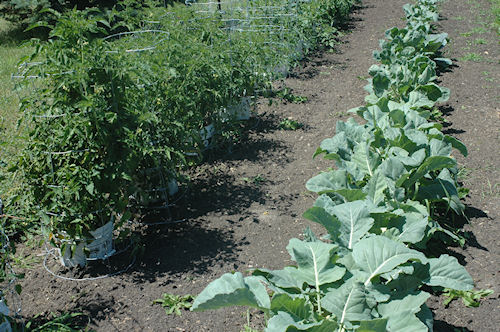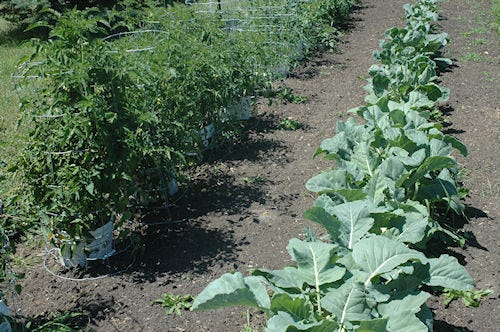
Several studies this year have revealed that there is no nutritional advantage to eating organic food vs. conventionally raised food. The latest study published Monday, Oct. 22 by researchers and pediatricians shows that organic food is no better than conventional food for kids when it comes to nutritional value.

CONVENTIONAL OR ORGANIC?: You can't tell from looking at this photo whether the vegetables growing in my family's garden are conventionally raised or organically grown. Here's a clue – there aren't too many weeds in this garden because we use Preen, a product that contains a herbicide to help control weeds.
"Pretty much every study shows no nutritional difference," said Dr. Janet Silverstein, a professor of pediatric endocrinology at the University of Florida. Silverstein and her team conducted their research on organic and conventionally produced foods including fruits, vegetables, dairy products and meat. Issues such as nutrition, hormones, antibiotics and synthetic chemical exposure were highlighted in the report. Also included were additional factors such as environmental impact and price considerations.
My favorite line in this latest study says, "The nation's pediatricians and nutritional experts have considered this issue for the first time and initial reports have revealed that organic food may be as nutritional as conventional food and not more."
Now I have nothing against organic food. There is plenty of organic food produced in Wisconsin, including hundreds of organic dairy farms. In fact, Wisconsin is home to more organic dairy farms than any other state in the nation. I don't have a problem with that. And I don't have a problem with organic food. These farms are filling a niche market created by thousands of consumers who want to feed their families organic dairy products, organically grown fruits and vegetables and organically grown meats and they're willing to pay for it. And pay for it they do! Organic milk in grocery stores sells for more than $6 a gallon or double what a gallon of conventional milk sells for; ditto for organic produce, including apples, celery, lettuce and bananas. And organically grown meat – most of it from grazed beef and free-range chickens – sells for as much as three times more than conventionally raised beef and chickens.
If a consumer wants to pay two or three times as much for a product because that's what they want, then that's fine with me. It's their money and their beliefs. Where I draw the line is when these same people try to impose their beliefs onto others and choose to look down at others who can't afford to buy organic for their families or choose to buy conventional because they don't see any difference between conventionally grown food and organic food.
And now we know what most farmers have always known – there is no nutritional difference. In some cases, I beg to differ. I grew up eating plenty of organically grown apples. My parents had apple trees on our farm. They made their own apple cider from those apples and I remember growing up eating baked apples, pies and crisps made from those apples. My mom would cut out the "bad spots." I also remember plucking and apple off the tree and taking a big bite of it only to find half a worm! Of course you know where the other half was. So I learned at a young age that I preferred eating conventionally grown apples from the store to the ones grown on a tree in my backyard.
What is sad is that so many consumers have bought into the myth that organic is better than conventionally raised food. It forces some consumers who can't afford organic food to feel guilty when they shouldn't. As the pediatricians in this latest study said, what is important is feeding your family a balanced diet made up of wholesome food including meat, vegetables, fruits, dairy products and grains. It doesn't matter if the foods are organically grown or not.
Meanwhile, parents who give their children organic foods are still probably not convinced by these findings and despite the findings of this study and others, most likely will keep buying organic foods for their families.
About the Author(s)
You May Also Like






